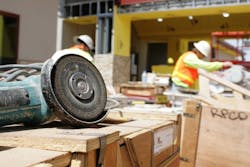Construction employment increases in 211 out of 358 metro areas from December 2018 to 2019
Construction employment grew in 211, or 59%, out of 358 metro areas between December 2018 and December 2019, declined in 73 and was unchanged in 74, according to a new analysis of federal employment data released today by the Associated General Contractors of America. Association officials said that many firms report they are having a hard time finding enough qualified workers to hire, which likely undermined employment gains in some parts of the country.
“There are not enough qualified workers in many parts of the country for firms to be able to keep pace with strong demand for work,” said Ken Simonson, the association’s chief economist. “Construction workforce shortages appear to be holding back further job gains in many parts of the country.”
The Dallas-Plano-Irving, Texas metro area added the most construction jobs in 2019 (16,700 jobs, 11%). Other metro areas adding a large amount of construction jobs during the past 12 months include Los Angeles-Long Beach-Glendale, Calif. (12,300 jobs, 8%); Las Vegas-Henderson-Paradise, Nev. (9,400 jobs, 14%); Houston-The Woodlands-Sugar Land, Texas (9,300 jobs, 4%) and San Diego-Carlsbad, Calif. (8,600 jobs, 10%). The largest percentage gain occurred in Kansas City, Mo. (17%, 4,800 jobs), followed by Omaha-Council Bluffs, Neb.-Iowa (16%, 4,500 jobs); Auburn-Opelika, Ala. (15 percent, 400 jobs) and Rochester, N.Y. (15 percent, 3,000 jobs). Construction employment reached a new December high in 71 metro areas and a new December low in four areas.
The largest job losses between December 2018 and December 2019 occurred in New York City (-4,500 jobs, -3%), followed by Northern Virginia (-2,900 jobs, -4%); Riverside-San Bernardino-Ontario, Calif. (-2,600 jobs -3%) and Cincinnati, Ohio-Ky. (-2,400 jobs, -5%). The largest percentage decrease took place in Fairbanks, Alaska (-12%, -300 jobs), followed by Longview, Texas (-10%, -1,400 jobs); Wichita Falls, Texas (-10%, -300 jobs); Victoria, Texas (-9%, -400 jobs) and Huntington-Ashland, W.Va.-Ky.-Ohio (-9%, -700 jobs).
Association officials said workforce shortages were undermining strong employment gains in many parts of the country and urged federal officials to take steps to encourage more people to pursue high-paying construction careers. These steps include doubling federal investments in career and technical education to expose more students to construction career opportunities. And they called on Washington officials to establish a temporary work visa program to allow people with construction skills to work in markets impacted by labor shortages.
“Given the current state of demand for their services, many construction firms would be hiring more workers if only they could find them,” said Stephen E. Sandherr, the association’s chief executive officer. “Instead of convincing young adults to go into debt to pay for college, Congress and the administration should expose them to other options, including high-paying construction careers.”
View the metro employment data, rankings, top 10, history and map.
